Fleurs du Mal Magazine


Or see the index
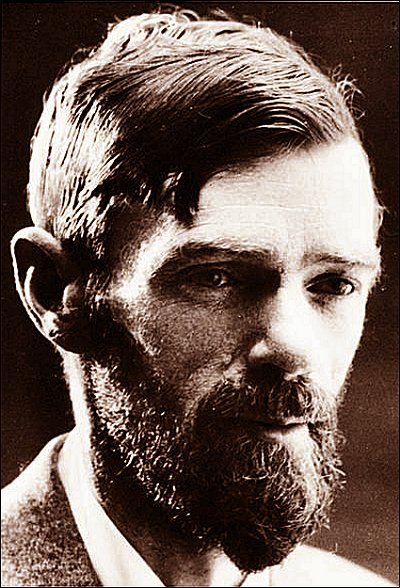
D. H. Lawrence
(1885-1930)
The Elephant is Slow to Mate
The elephant, the huge old beast,
is slow to mate;
he finds a female, they show no haste
they wait
for the sympathy in their vast shy hearts
slowly, slowly to rouse
as they loiter along the river-beds
and drink and browse
and dash in panic through the brake
of forest with the herd,
and sleep in massive silence, and wake
together, without a word.
So slowly the great hot elephant hearts
grow full of desire,
and the great beasts mate in secret at last,
hiding their fire.
Oldest they are and the wisest of beasts
so they know at last
how to wait for the loneliest of feasts
for the full repast.
They do not snatch, they do not tear;
their massive blood
moves as the moon-tides, near, more near
till they touch in flood.
D.H. Lawrence poetry
fleursdumal.nl magazine
More in: Archive K-L, D.H. Lawrence, Lawrence, D.H.
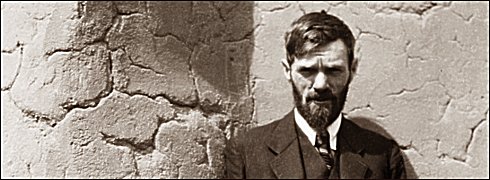
D. H. Lawrence
(1885-1930)
Green
The dawn was apple-green,
The sky was green wine held up in the sun,
The moon was a golden petal between.
She opened her eyes, and green
They shone, clear like flowers undone
For the first time, now for the first time seen.
D.H. Lawrence poetry
fleursdumal.nl magazine
More in: Archive K-L, D.H. Lawrence, Lawrence, D.H.
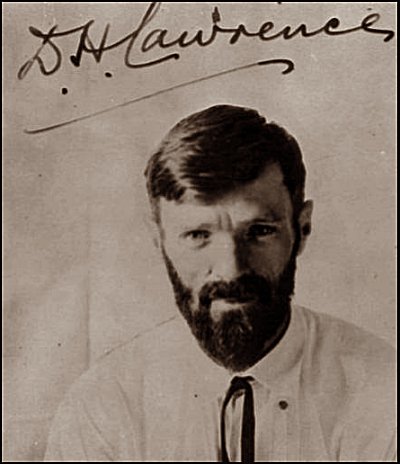
D. H. Lawrence
(1885-1930)
Whales Weep Not!
They say the sea is cold, but the sea contains
the hottest blood of all, and the wildest, the most urgent.
All the whales in the wider deeps, hot are they, as they urge
on and on, and dive beneath the icebergs.
The right whales, the sperm-whales, the hammer-heads, the killers
there they blow, there they blow, hot wild white breath out of
the sea!
And they rock, and they rock, through the sensual ageless ages
on the depths of the seven seas,
and through the salt they reel with drunk delight
and in the tropics tremble they with love
and roll with massive, strong desire, like gods.
Then the great bull lies up against his bride
in the blue deep bed of the sea,
as mountain pressing on mountain, in the zest of life:
and out of the inward roaring of the inner red ocean of whale-blood
the long tip reaches strong, intense, like the maelstrom-tip, and
comes to rest
in the clasp and the soft, wild clutch of a she-whale’s
fathomless body.
And over the bridge of the whale’s strong phallus, linking the
wonder of whales
the burning archangels under the sea keep passing, back and
forth,
keep passing, archangels of bliss
from him to her, from her to him, great Cherubim
that wait on whales in mid-ocean, suspended in the waves of the
sea
great heaven of whales in the waters, old hierarchies.
And enormous mother whales lie dreaming suckling their whale-
tender young
and dreaming with strange whale eyes wide open in the waters of
the beginning and the end.
And bull-whales gather their women and whale-calves in a ring
when danger threatens, on the surface of the ceaseless flood
and range themselves like great fierce Seraphim facing the threat
encircling their huddled monsters of love.
And all this happens in the sea, in the salt
where God is also love, but without words:
and Aphrodite is the wife of whales
most happy, happy she!
and Venus among the fishes skips and is a she-dolphin
she is the gay, delighted porpoise sporting with love and the sea
she is the female tunny-fish, round and happy among the males
and dense with happy blood, dark rainbow bliss in the sea.
D.H. Lawrence poetry
fleursdumal.nl magazine
More in: Archive K-L, D.H. Lawrence, Lawrence, D.H.
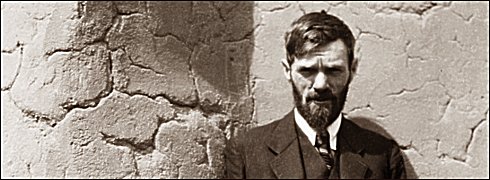
D. H. Lawrence
(1885-1930)
Last Words to Miriam
Yours is the shame and sorrow
But the disgrace is mine;
Your love was dark and thorough,
Mine was the love of the sun for a flower
He creates with his shine.
I was diligent to explore you,
Blossom you stalk by stalk,
Till my fire of creation bore you
Shrivelling down in the final dour
Anguish—then I suffered a balk.
I knew your pain, and it broke
My fine, craftsman’s nerve;
Your body quailed at my stroke,
And my courage failed to give you the last
Fine torture you did deserve.
You are shapely, you are adorned,
But opaque and dull in the flesh,
Who, had I but pierced with the thorned
Fire-threshing anguish, were fused and cast
In a lovely illumined mesh.
Like a painted window: the best
Suffering burnt through your flesh,
Undressed it and left it blest
With a quivering sweet wisdom of grace: but now
Who shall take you afresh?
Now who will burn you free,
From your body’s terrors and dross,
Since the fire has failed in me?
What man will stoop in your flesh to plough
The shrieking cross?
A mute, nearly beautiful thing
Is your face, that fills me with shame
As I see it hardening,
Warping the perfect image of God,
And darkening my eternal fame.
D.H. Lawrence poetry
fleursdumal.nl magazine
More in: Archive K-L, D.H. Lawrence, Lawrence, D.H.
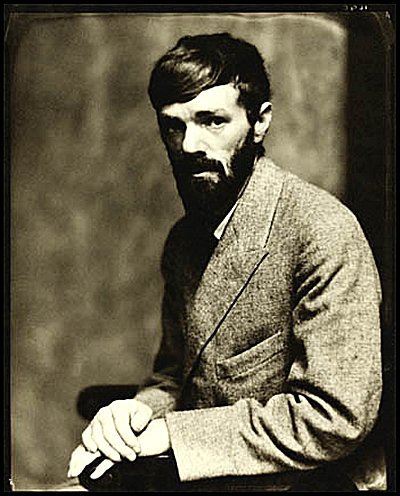
D. H. Lawrence
(1885-1930)
Snake
A snake came to my water-trough
On a hot, hot day, and I in pyjamas for the heat,
To drink there.
In the deep, strange-scented shade of the great dark carob-tree
I came down the steps with my pitcher
And must wait, must stand and wait, for there he was at the trough before
me.
He reached down from a fissure in the earth-wall in the gloom
And trailed his yellow-brown slackness soft-bellied down, over the edge of
the stone trough
And rested his throat upon the stone bottom,
i o And where the water had dripped from the tap, in a small clearness,
He sipped with his straight mouth,
Softly drank through his straight gums, into his slack long body,
Silently.
Someone was before me at my water-trough,
And I, like a second comer, waiting.
He lifted his head from his drinking, as cattle do,
And looked at me vaguely, as drinking cattle do,
And flickered his two-forked tongue from his lips, and mused a moment,
And stooped and drank a little more,
Being earth-brown, earth-golden from the burning bowels of the earth
On the day of Sicilian July, with Etna smoking.
The voice of my education said to me
He must be killed,
For in Sicily the black, black snakes are innocent, the gold are venomous.
And voices in me said, If you were a man
You would take a stick and break him now, and finish him off.
But must I confess how I liked him,
How glad I was he had come like a guest in quiet, to drink at my water-trough
And depart peaceful, pacified, and thankless,
Into the burning bowels of this earth?
Was it cowardice, that I dared not kill him?
Was it perversity, that I longed to talk to him?
Was it humility, to feel so honoured?
I felt so honoured.
And yet those voices:
If you were not afraid, you would kill him!
And truly I was afraid, I was most afraid, But even so, honoured still more
That he should seek my hospitality
From out the dark door of the secret earth.
He drank enough
And lifted his head, dreamily, as one who has drunken,
And flickered his tongue like a forked night on the air, so black,
Seeming to lick his lips,
And looked around like a god, unseeing, into the air,
And slowly turned his head,
And slowly, very slowly, as if thrice adream,
Proceeded to draw his slow length curving round
And climb again the broken bank of my wall-face.
And as he put his head into that dreadful hole,
And as he slowly drew up, snake-easing his shoulders, and entered farther,
A sort of horror, a sort of protest against his withdrawing into that horrid black hole,
Deliberately going into the blackness, and slowly drawing himself after,
Overcame me now his back was turned.
I looked round, I put down my pitcher,
I picked up a clumsy log
And threw it at the water-trough with a clatter.
I think it did not hit him,
But suddenly that part of him that was left behind convulsed in undignified haste.
Writhed like lightning, and was gone
Into the black hole, the earth-lipped fissure in the wall-front,
At which, in the intense still noon, I stared with fascination.
And immediately I regretted it.
I thought how paltry, how vulgar, what a mean act!
I despised myself and the voices of my accursed human education.
And I thought of the albatross
And I wished he would come back, my snake.
For he seemed to me again like a king,
Like a king in exile, uncrowned in the underworld,
Now due to be crowned again.
And so, I missed my chance with one of the lords
Of life.
And I have something to expiate:
A pettiness.
Taormina, 1923
D. H. Lawrence: Snake
fleursdumal.nl magazine
More in: Archive K-L, D.H. Lawrence, Lawrence, D.H.
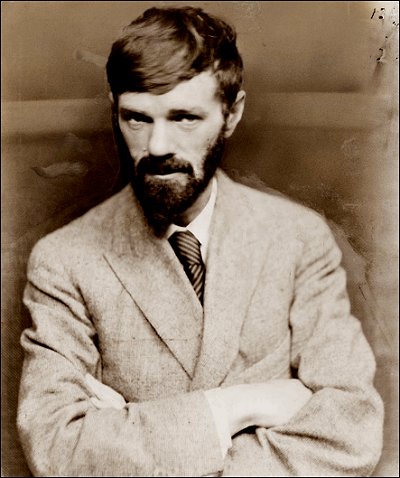
D. H. Lawrence
(1885-1930)
After The Opera
Down the stone stairs
Girls with their large eyes wide with tragedy
Lift looks of shocked and momentous emotion up at me.
And I smile.
Ladies
Stepping like birds with their bright and pointed feet
Peer anxiously forth, as if for a boat to carry them out of the wreckage,
And among the wreck of the theatre crowd
I stand and smile.
They take tragedy so becomingly.
Which pleases me.
But when I meet the weary eyes
The reddened aching eyes of the bar-man with thin arms,
I am glad to go back to where I came from.
D. H. Lawrence poetry
fleursdumal.nl magazine
More in: Archive K-L, D.H. Lawrence, Lawrence, D.H.
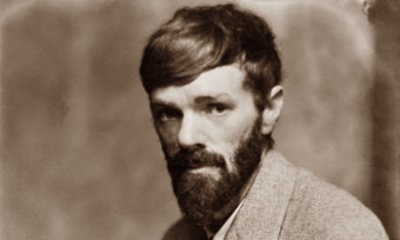
D. H. Lawrence
(1885-1930)
A Young Wife
The pain of loving you
Is almost more than I can bear.
I walk in fear of you.
The darkness starts up where
You stand, and the night comes through
Your eyes when you look at me.
Ah never before did I see
The shadows that live in the sun!
Now every tall glad tree
Turns round its back to the sun
And looks down on the ground, to see
The shadow it used to shun.
At the foot of each glowing thing
A night lies looking up.
Oh, and I want to sing
And dance, but I can’t lift up
My eyes from the shadows: dark
They lie spilt round the cup.
What is it? – Hark
The faint fine seethe in the air!
Like the seething sound in a shell!
It is death still seething where
The wild-flower shakes its bell
And the sky lark twinkles blue –
The pain of loving you
Is almost more than I can bear.
D. H. Lawrence poetry
fleursdumal.nl magazine
More in: Archive K-L, D.H. Lawrence, Lawrence, D.H.

D. H. Lawrence
(1885-1930)
All Souls
They are chanting now the service of All the Dead
And the village folk outside in the burying ground
Listen – except those who strive with their dead,
Reaching out in anguish, yet unable quite to touch them:
Those villagers isolated at the grave
Where the candles burn in the daylight, and the painted wreaths
Are propped on end, there, where the mystery starts.
The naked candles burn on every grave.
On your grave, in England, the weeds grow.
But I am your naked candle burning,
And that is not your grave, in England,
The world is your grave.
And my naked body standing on your grave
Upright towards heaven is burning off to you
Its flame of life, now and always, till the end.
It is my offering to you; every day is All Souls’ Day.
I forget you, have forgotten you.
I am busy only at my burning,
I am busy only at my life.
But my feet are on your grave, planted.
And when I lift my face, it is a flame that goes up
To the other world, where you are now.
But I am not concerned with you.
I have forgotten you.
I am a naked candle burning on your grave.
D. H. Lawrence poetry
kempis.nl poetry magazine
More in: Archive K-L, Lawrence, D.H.
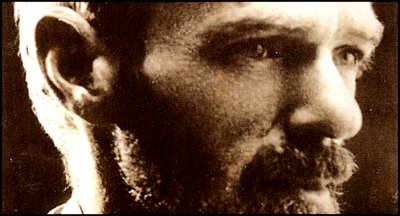
D. H. Lawrence
(1885-1930)
A Baby Running Barefoot
When the bare feet of the baby beat across the grass
The little white feet nod like white flowers in the wind,
They poise and run like ripples lapping across the water;
And the sight of their white play among the grass
Is like a little robin’s song, winsome,
Or as two white butterflies settle in the cup of one flower
For a moment, then away with a flutter of wings.
I long for the baby to wander hither to me
Like a wind-shadow wandering over the water,
So that she can stand on my knee
With her little bare feet in my hands,
Cool like syringa buds,
Firm and silken like pink young peony flowers.
D. H. Lawrence poetry
kempis.nl poetry magazine
More in: Archive K-L, Lawrence, D.H.
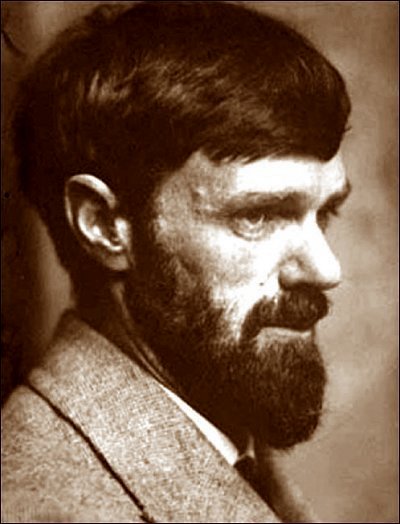
D. H. Lawrence
(1885-1930)
After Many Days
I wonder if with you, as it is with me,
If under your slipping words, that easily flow
About you as a garment, easily,
Your violent heart beats to and fro!
Long have I waited, never once confessed,
Even to myself, how bitter the separation;
Now, being come again, how make the best
Reparation?
If I could cast this clothing off from me,
If I could lift my naked self to you,
Or if only you would repulse me, a wound would be
Good; it would let the ache come through.
But that you hold me still so kindly cold
Aloof my flaming heart will not allow;
Yea, but I loathe you that you should withhold
Your pleasure now.
D. H. Lawrence poetry
kempis.nl poetry magazine
More in: Archive K-L, Lawrence, D.H.

D. H. Lawrence
(1885-1930)
A Baby Asleep After Pain
As a drenched, drowned bee
Hangs numb and heavy from a bending flower,
So clings to me
My baby, her brown hair brushed with wet tears
And laid against her cheek;
Her soft white legs hanging heavily over my arm
Swinging heavily to my movement as I walk.
My sleeping baby hangs upon my life,
Like a burden she hangs on me.
She has always seemed so light,
But now she is wet with tears and numb with pain
Even her floating hair sinks heavily,
Reaching downwards;
As the wings of a drenched, drowned bee
Are a heaviness, and a weariness.
D. H. Lawrence poetry
kempis.nl poetry magazine
More in: Archive K-L, Lawrence, D.H.
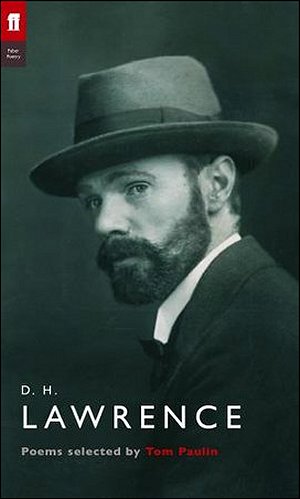
D.H. Lawrence
(1885-1930)
To Women, As Far As I’m Concerned
The feelings I don’t have I don’t have.
The feelings I don’t have, I won’t say I have.
The felings you say you have, you don’t have.
The feelings you would like us both to have, we
neither of us have.
The feelings people ought to have, they never have.
If people say they’ve got feelings, you may be pretty
sure they haven’t got them
So if you want either of us to feel anything at all
you’d better abandon all idea of feelings altogether.
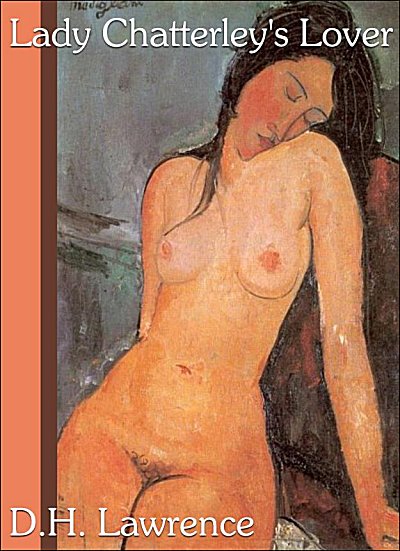
Intimates
Don’t you care for my love? she said bitterly.
I handed her the mirror, and said:
Please address these questions to the proper person!
Please make all request to head-quarters!
In all matters of emotional importance
please approach the supreme authority direct!–
So I handed her the mirror.
And she would have borken it over my head,
but she caught sight of her own refection
and that held her spellbound for two seconds
while I fled.
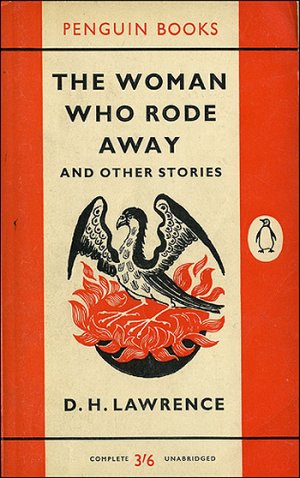
My Naughty Book
They say I wrote a naughty book
With perfectly awful things in it,
putting in all the impossible words
like b—- and f— and sh–.
Most of my friends were deeply hurt
and haven’t forgiven me yet;
I’d loaded the camel’s back before
with dirt they couldn’t forget.
And now, no really, the final straw
was words like sh– and f–!
I heard the camel’s back go crack
beneath the weight of muck.
Then out of nowhere rushed John Bull,
that mildewed pup, good doggie!
squeakily bellowing for all he was worth,
and slavering wet and soggy.
He couldn’t bite ’em he was much too old,
but he made a pool of dribblings;
so while the other one heaved her sides
with moans and hollow bibblings
he did his best, the good old dog
to support her, the hysterical camel,
and everyone listend and loved it, the
ridiculus bimmel-bammel.
But still, one has no right to take
the old dog’s greenest bones
that he’s buried now for centuries
beneath England’s garden stones.
And, of course, one has no right to lay
such words to the camel’s charge
when she prefers to have them left
in the W.C. writ large.
Poor homely words, I must give you back
to the camel and the dog,
for her to mumble and him to crack
in secret, great golliwog!
And hereby I apologise
to all my foes and friends
for using words they privately keep
for their own immortal ends.
And henceforth I will never use
more than the chaste, short dash;
so do forgive me! I sprinkle my hair
with grey, repentant ash.

kemp=mag poetry magazine
More in: Lawrence, D.H.
Thank you for reading Fleurs du Mal - magazine for art & literature